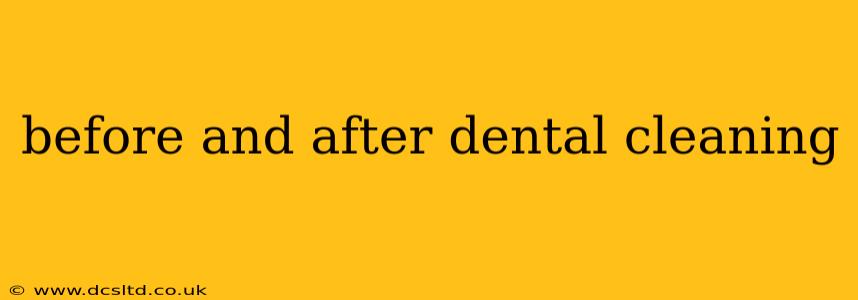Maintaining optimal oral health is crucial for overall well-being. Regular dental cleanings play a vital role in preventing cavities, gum disease, and other oral health problems. Understanding what to expect before and after a professional cleaning can help alleviate any anxieties and ensure a positive experience. This comprehensive guide covers everything you need to know about the before and after aspects of dental cleaning, answering common questions and providing valuable insights.
What Happens Before a Dental Cleaning?
Before your cleaning, your dental hygienist will likely perform a few preliminary steps:
- Health History Review: You'll be asked to update your medical history, including any medications you're taking, allergies, or existing health conditions. This is crucial for your safety and to ensure the appropriate treatment.
- Oral Examination: The dentist or hygienist will conduct a thorough examination of your teeth and gums, checking for cavities, gum disease, and other potential issues. X-rays may be taken to assess the health of your teeth and jawbone.
- Discussion of Concerns: This is your opportunity to discuss any specific concerns or questions you have about your oral health.
What Happens During a Dental Cleaning?
The cleaning process itself typically involves:
- Scaling: This removes plaque and tartar (calculus) from above and below the gum line using specialized instruments. Scaling is crucial as plaque and tartar buildup can lead to gum disease and cavities.
- Polishing: After scaling, your teeth are polished to remove surface stains and leave your teeth feeling smooth and clean.
- Fluoride Treatment (Optional): Many dentists apply a fluoride treatment to strengthen your tooth enamel and help prevent cavities.
What to Expect After a Dental Cleaning?
After your cleaning, you might experience some temporary effects:
- Slight Sensitivity: Some individuals may experience mild tooth sensitivity to hot or cold temperatures for a short period. This is usually temporary and resolves quickly.
- Slight Bleeding: A small amount of bleeding from the gums is possible, especially if you have gum disease. This is normal and typically subsides within a day or two.
- Clean Feeling: The most noticeable effect is the clean and refreshed feeling of your teeth and mouth.
How Long Does it Take to Recover After a Dental Cleaning?
Recovery time is minimal. Most people experience no discomfort beyond minor sensitivity or bleeding, which usually resolves within 24-48 hours. However, if you experience prolonged or severe pain, bleeding, or any other unusual symptoms, contact your dentist immediately.
How Often Should I Get My Teeth Cleaned?
The American Dental Association (ADA) recommends professional dental cleanings every six months. However, the frequency might vary depending on your individual oral health needs. Your dentist will determine the best cleaning schedule for you.
What Can I Do to Maintain Good Oral Hygiene Between Cleanings?
Maintaining good oral hygiene between cleanings is essential for preventing dental problems. This includes:
- Brushing: Brush your teeth twice a day with fluoride toothpaste for at least two minutes each time.
- Flossing: Floss daily to remove plaque and food particles from between your teeth.
- Mouthwash (Optional): Using an antimicrobial mouthwash can help reduce bacteria and improve overall oral hygiene.
Can I Whiten My Teeth During a Dental Cleaning?
While a professional cleaning removes surface stains, it's not a teeth whitening treatment. If you are interested in teeth whitening, discuss options with your dentist. They can advise on in-office or at-home whitening methods.
What are the Benefits of Regular Dental Cleanings?
Regular dental cleanings offer numerous benefits, including:
- Prevention of Cavities: Removal of plaque and tartar prevents the formation of cavities.
- Prevention of Gum Disease: Regular cleanings help prevent and manage gum disease (gingivitis and periodontitis).
- Early Detection of Oral Cancer: Your dentist can detect signs of oral cancer during routine examinations.
- Improved Breath: Regular cleanings help eliminate bad breath caused by bacteria.
- Improved Overall Health: Maintaining good oral health is linked to overall health and well-being.
By understanding the before and after aspects of dental cleaning and practicing good oral hygiene, you can maintain a healthy smile and improve your overall health. Remember to schedule regular check-ups and cleanings with your dentist for optimal oral health.
